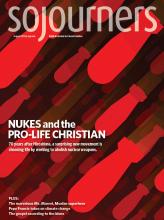IN 1900, 1 percent of Korea’s population was Christian. By 2010, roughly 3 in 10 South Koreans were Christian, including members of the world’s largest Pentecostal church, Yoido Full Gospel Church, in Seoul. The faith has exploded, and so now have the questions.
Each of the past several summers in Washington, D.C., I’ve met with 50 young Christian leaders from South Korea to discuss biblical social justice as it applies to their Korean context and perspectives on our shared Christian faith. They highlighted challenges they face, such as confusing financial and church growth with God’s favor; the stress that youth face in their ambition for a viable career; and the roles sometimes assigned to women and men in both church and society.
They also posed a critical question: Do you think of yourself as a Christian first or an American first? Out of our deep exploration came three convictions: First, national identity can be a deep blessing, but it cannot be our primary identity. Second, discussion works best without immediately judging our priority lists or our neighbors’ lists harshly. Third, the order of our lists should never be the cause of harm.
These rich dialogues with Korean faith leaders set the stage for an unusual opportunity: attending the Global Forum for the Future of World Christianity held on Jeju, the politically contested island off the coast of South Korea.
Read the Full Article

